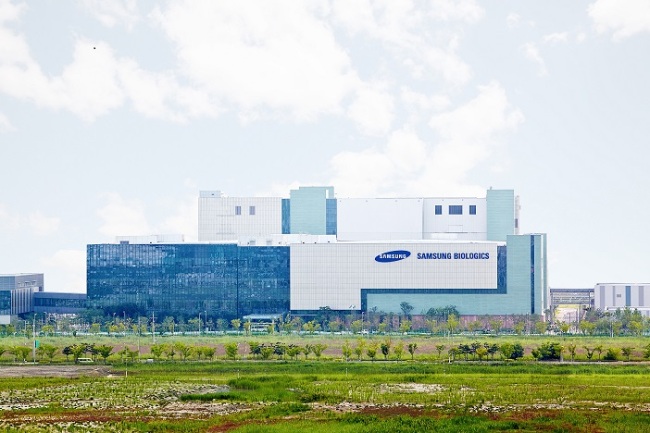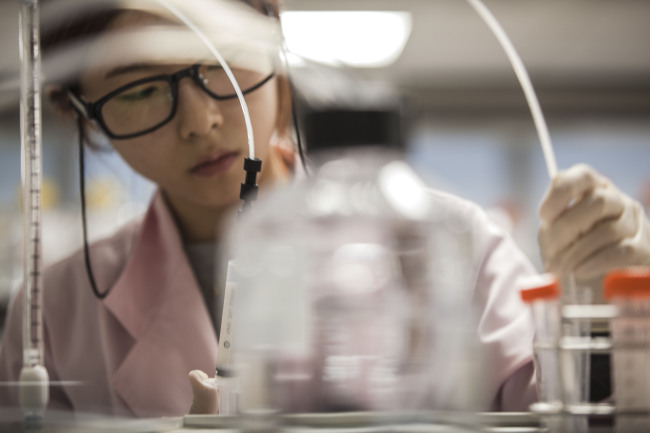[DECODED] Samsung bets future on biopharmaceuticals
2016-07-21 16:31
South Korean electronics giant Samsung Group is looking to make its mark in a new, promising field — biopharmaceuticals. At the heart of the push are the tech conglomerate's two young units — Samsung BioLogics and Samsung Bioepis.The former, founded in 2011, is a contract manufacturer of biologic drugs developed by pharmaceutical companies around the world while the latter, established in 2012, focuses on developing biosimilars — near-replicas of complex biologic drugs that have lost patent protection.
 |
| Samsung BioLogics employees inspect a bioreactor at its second plant in Songdo, Incheon. (Samsung BioLogics) |
So far, Samsung has invested some 3 trillion won ($2.6 billion) into its biotechnology business, as it looks to make BioLogics a top manufacturing partner to the world’s major pharmaceutical companies and Bioepis a leader in the still-nascent yet lucrative biosimilars business.
Why is Samsung betting its future in the biopharmaceutical industry, and how does it plan to succeed in this new and seemingly foreign field?
For a start, Samsung saw vast market potential in biologics — complex drugs based on living cells, blood components and tissues used in treating various chronic ailments such as rheumatoid arthritis and cancer.
Led by the growth in aging populations around the world, the global biologic drug market is expected to surpass around $390 billion in sales by 2020, taking up nearly a third of the global pharmaceutical market by value, according to the IMS Institute for Healthcare Informatics.
In breaking into the global biopharma supply chain long dominated by Western pharmaceutical giants with strong R&D capabilities, Samsung believed it could excel in one aspect — manufacturing.
 |
| The Samsung BioLogics headquarters in Songdo, Incheon (Samsung BioLogics) |
Samsung BioLogics
By mass-producing drugs on behalf of global drug companies, Samsung is looking to shift the industry’s current production paradigm from self-production to outsourcing, as Samsung Electronics did with semiconductors back in the 1970s, said Samsung BioLogics CEO Kim Tae-han.
“Right now, contract manufacturing takes up only about 20-30 percent of global biopharma companies’ total production volume,” Kim told local reporters during a press conference back in December 2015.
“By supplying high-quality products at competitive prices, as Samsung did when it first jumped into the semiconductor manufacturing business, we hope that global biopharma companies will partner with CMOs like us over investing huge sums of money into expanding their own facilities,” he said.
Samsung BioLogics’ vision is to become the world’s No. 1 contract manufacturer of biologic drugs by 2020 by quickly expanding its production capacity to take advantage of the economies of scale. Its current goal is to record sales of 1 trillion won by 2020 and 2 trillion by 2025.
Samsung claims it can build its biologics drug production plants quicker and at lower costs thanks to its exclusive strengths in designing, building and operating high-quality manufacturing facilities such as semiconductor plants.
Over the past five years, Samsung BioLogics has managed to build -- faster than any of its competitors -- two high-tech biologics manufacturing plants boasting a combined production capacity of 180,000 liters, the third largest in the world. They manufacture commercial biologics developed by its clients Bristol-Myers Squibb and Roche.
Samsung BioLogics is currently building its third plant, which it claims will produce biologics at around 43 percent of the cost of its global competitors, according to Samsung’s calculations based on investment to capacity ratios.
Upon its scheduled completion in 2018, the new plant will drive up the company’s net capacity to 360,000 liters, leapfrogging current segment leaders Lonza (260,000 liters) and Boehringer Ingelheim (240,000 liters).
Samsung BioLogics plans to continue adding more production plants, using the new capital to be generated by its initial public offering on the KOSPI scheduled for later this year.
The company declined to comment on the potential size of the IPO. However, industry analysts estimate at least 3 trillion won worth of new shares will be issued through the offering.
 |
| A Samsung Bioepis employee in a research lab at the company's headquarters in Songdo, Incheon (Samsung Bioepis) |
Samsung Bioepis
At the same time, Samsung’s drug development unit Samsung Bioepis, a joint venture between Samsung BioLogics and U.S.-based Biogen, has been tackling the lucrative biologics market from a different angle — biosimilars.
Biosimilars refer to cheaper, near-replicas of complex, biologic drugs which have lost patent protection. Unlike conventional chemical drugs, biologics are based on living cells and proteins, making them more difficult to produce as well as impossible to replicate perfectly.
Samsung Bioepis has been developing biosimilar versions of some of the world’s top-selling biologic drugs such as Amgen’s Enbrel, Johnson & Johnson’s Remicade and AbbVie’s Humira, ahead of their patent expiration dates.
In doing so, they are looking to steal away a share of the high profits previously enjoyed by the original makers of the world’s blockbuster biologic drugs, and in turn, lower healthcare costs by widening the treatment options available in the market.
The IMS Institute for Healthcare Informatics predicts biosimilars will save as much as $110 billion for health systems in Europe and the U.S., the largest market for biopharmaceuticals, by 2020.
Bioepis is aiming for a target revenue of 1 trillion won ($872 million) by 2020, which hinges on the successful commercialization of its biosimilars in the U.S. and Europe, the world’s top two biopharmaceuticals markets.
Samsung Bioepis has six products under development, two of which have already been approved in Europe and has begun sales in some countries in the region through its European marketing partner Biogen.
Its biosimilars referencing Enbrel and Remicade, whose European patents have already expired, were approved by the European Medicines Agency in January and May of this year, respectively.
It is currently seeking regulatory approval to sell its Humira biosimilar in Europe while awaiting approval from the U.S. Food and Drug Administration to commercialize its Remicade biosimilar in the U.S.
On top of clearing regulatory hurdles, Samsung Bioepis and other biosimilar developers face legal battles against the original makers of the biologic drugs that are being replicated — such as one challenging new patents filed by AbbVie, the developer of Humira.
To fund its continued expansion, Samsung Bioepis is planning a public listing on the U.S. Nasdaq in the near future, which could raise about $1 billion, according to market speculations. However, the company has indefinitely delayed the IPO for now, citing market volatility.
By Sohn Ji-young (jys@heraldcorp.com)


